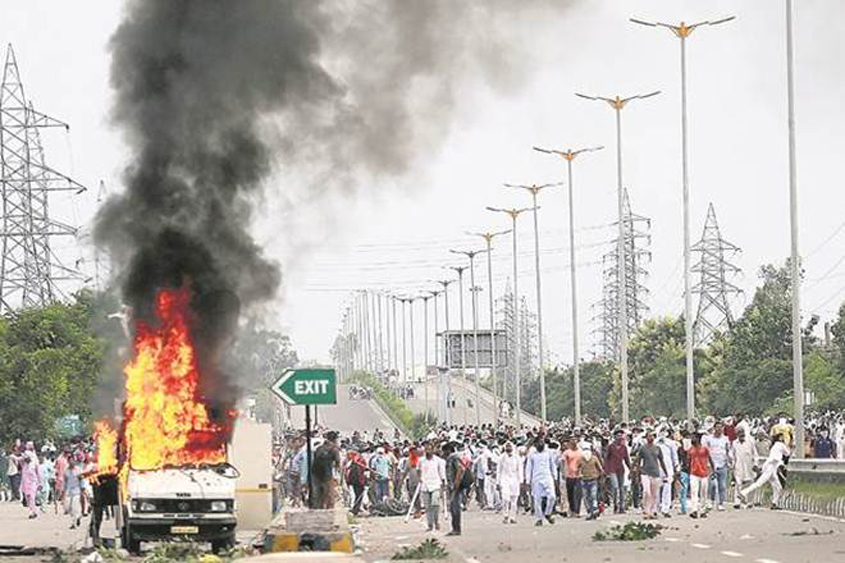 Political discourse, the lifeline of a democratic society has become so partisan, so ideologically driven and vindictive in nature in India that it has been reduced to a crude, counter-intuitive and blinkered proposition; more corrosive than constructive in its intent. Nothing illustrates this more than the ugly narrative, both verbal and physical, that unfolded post the rape verdict pronounced against Guru Ram Rahim Singh.
Political discourse, the lifeline of a democratic society has become so partisan, so ideologically driven and vindictive in nature in India that it has been reduced to a crude, counter-intuitive and blinkered proposition; more corrosive than constructive in its intent. Nothing illustrates this more than the ugly narrative, both verbal and physical, that unfolded post the rape verdict pronounced against Guru Ram Rahim Singh.
A felony such as rape is a heinous crime that has no exclusive ownership; it is a universally prevalent atrocity that cuts across caste, religious or racial barriers; neither is sexual predatory behaviour endemic to godmen of any one community, as some have made it out to be.
The Catholic Church has had to deal with widespread paedophilia amongst its flock worldwide; a grievous malady that it tried to wish away by massive cover ups that reached all the way up to the Vatican. Closer to home we have the instance of Father Vadakkumchery, former vicar of St Sebastian’s Church at Kottiyoor in Kerala, who impregnated a minor girl and utilised the influential church machinery to conceal his crime. Similarly, there have been innumerable instances of Hindu and Muslim clergy who have exploited their veneration to coerce sexual favours.
What this incident should have engendered was an objective impartial discussion to ensure that gullible women do not fall prey to unscrupulous godmen, or poor, innocent boys and girls lured into religious orders are not sexually harassed. But instead, we are witnessing a cantankerous public wrangling that has religion and politics as its theme.
The violent protest that followed was also subject to same distracting scrutiny with religious and political subtexts. A senior Congress leader castigated the BJP, as though his own party had not committed any such lapses and a journalist remarked that “were the Dera armies Muslim” it would have sparked a debate on terrorism, implying a differential treatment. Both viewpoints are totally irrelevant to the issue at hand: the serious implication of rampant vandalism to social order appears to have escaped the notice of these respectable and responsible worthies. We need to focus on a pressing issue: the elephant in the room—the question of public disorderliness that is the bane of our society.
Freedom is not an unbridled licence to indulge in a free for all. It comes with a degree of responsibility. There is basic inability to understand this concept on the part of several Indians. Whenever a decision or any event in any part of the world rolls out, which is not to one’s liking, these goons mill out on to the streets, dispersing death and destruction in their path. Public assets and even personal property like cars parked on the streets become easy targets, resulting in significant fiscal losses.
The sheer absurdity and ludicrousness of protest is illustrated by a riot that took place in Bengaluru a few years ago. In 2007, Saddam Hussein was executed after a US led invasion took over Iraq. India and the Hindus of India, including Bengaluru had nothing to do with it. But yet, Muslims who, in all probability, did not know who Saddam Hussein was, apart from the fact that he had “Hussein” in his name, took to the streets in violent protest, ransacking Hindu shops and burning as many as 15 cars belonging to hapless private individuals.
For a protest to be valid it must be relevant (unlike the Bengaluru riot) and logically tenable; a protest against a court verdict makes a mockery of our justice system and undermines our democracy. Additionally, violence of any sort and destruction of public property or any property as a signature of protest is unacceptable.
In summary, there are three take home messages, First, we need to celebrate the impartiality of our judiciary, which has proved unequivocally that no one is above the law; second, we need to raise public awareness with regard to unscrupulous godmen; and third, we need to ensure that mobocracy will not prevail by imposing hefty deterrent penalties on the perpetrators and organisers of destructive protest.
Vivek Gumaste is a US based academic and political commentator.

